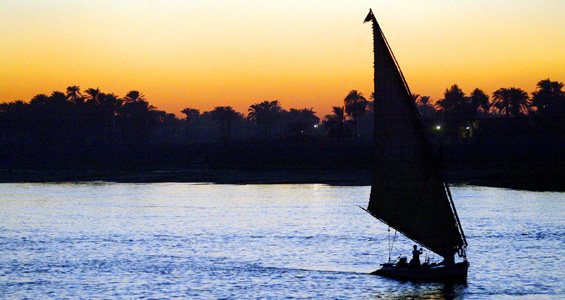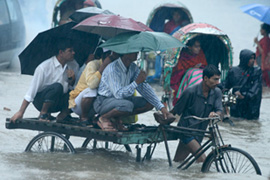Waters of opportunity, not conflict
Fair access to and management of international waters top World Water Week agenda.

 |
| The Nile and its tributaries flow across 10 countries from Africa to the Mediterranean Sea [EPA] |
Fair access and proper management of international waters are top of the agenda at the World Water Week conference held in Stockholm this week, say Anders Berntell of the Stockholm International Water Institute and David Grey of the World Bank.
High in the Mountains of the Moon in Central Africa, the most distant headwaters of the Nile begin their 6,500 km journey northwards to the Mediterranean Sea.
Keep reading
list of 4 itemsAfter the Hurricane
World’s coral reefs face global bleaching crisis
Why is Germany maintaining economic ties with China?
Today, the Nile and its tributaries cross the borders of 10 countries, home to more than 300 million people in a region of widespread poverty and, in some places, conflict.
In densely populated uplands, poor farmers till steep slopes and precious topsoil is washed away with the rains. In these uplands, less than five per cent of the Nile’s hydropower potential has been realised.
In the lowlands, subsistence farmers live year-to-year with great risks from highly variable rains, without the benefit of supplementary irrigation.
In the drylands, pastoralists hope for rain and move their livestock to where it falls. In the deserts, settled livelihoods are only possible along the river on land sustained once by seasonal floods, now by industry and irrigation.
Improved management and development of the Nile would bring great opportunities for the people of the basin, but there have long been tensions between the countries that share the river.
The Nile remains one of the least developed rivers of the world.
Bitter conflict
Over the past decade, the countries of the Nile have embarked on a journey to explore co-operation, tackling the challenges of an often bitter past and seeking opportunities for a brighter future.
Like the Nile, other great rivers around the world rise in mountains, merge in foothills, pour into floodplains and flow out to the sea, forever binding highland communities to lowland cities and farmers.
One-hundred-and-sixty rivers cross national boundaries, creating huge inter-dependencies and inter-connectedness between nations.
About 60 per cent of the world’s population live within international river basins. More importantly, more than 90 per cent live in the countries that share rivers with other countries.
|
“Climate change compounds the already significant challenges of managing international waters” |
Less visible than rivers and lakes – and often ‘out of sight and out of mind’ – groundwater aquifers are also shared by numerous countries; many of them are being increasingly exploited to meet growing water demand.
International waters figure prominently this week in Stockholm – where thousands of experts, advocates and policy makers are convening for World Water Week, a global conference that has become the annual focal point for the world’s most urgent water-related issues.
The theme for this year is transboundary waters, and much of the deliberations focus on the duality of challenge and opportunity that characterise regions such as the Nile basin.
Climate change compounds the already significant challenges of managing international waters.
Rivers emerging from the glaciers of Mounts Everest and Annapurna flow down through the foothills of Nepal into the main stem of the Ganges, a great river that courses across vast floodplains in northern India, on to its delta in Bangladesh and into the Bay of Bengal.
South Asia’s monsoon has always been unpredictable, deluging the mountains and floodplains over just three months.
Climate migrants
In 2007, for example, 57 million people in India were severely affected by monsoon floods. Some were no doubt forced to leave their home as climate migrants, some crossing state boundaries, some perhaps crossing international boundaries.
Climate change models – although known to be inadequate – predict an intensified monsoon, meaning more floods and more droughts in the Ganges basin, home to more than 400 million people across four countries.
What does a future of climate change mean for the people of this, the world’s most populated river basin?
 |
| Some analysts believe climate change has intensified monsoon flooding [EPA] |
Stories of the Nile and the Ganges, and similarly unique stories of many other international waters, form the backdrop for the discussions this week in Stockholm.
Some will argue that “water wars” are inevitable.
Others will argue the opposite: that the challenges faced today will lead inevitably to countries finding common solutions.
But this argument that pits the inevitability of war against that of co-operation is perhaps misplaced.
Instead, the challenge for us in a world of changing economies, populations and climates, is to ensure that the potential for conflict over water is reduced and the potential for co-operation over water is increased. What are needed are specific actions that promote co-operation.
With growing populations and economies, competition for water has increased at all levels, between communities and farmers, between urban and rural areas, between industries and ecosystems, and, most worryingly, between countries sharing river basins.
The record shows that agreements to regulate transboundary competition for water are difficult to achieve because each country seeks to maximise its own opportunity and minimise its own risks.
Bargaining power
Asymmetries in economic and political bargaining power between states and nations also present a daunting barrier to effective co-operation.
Power asymmetries between states can reduce prospects for effective co-operation and strengthening of weaker states’ capacity to engage will assist in reaching rational outcomes.
|
“A ‘level playing field’ of capacity needs to be ensured, to balance skill and power asymmetries that will otherwise be a barrier to rational deals” |
Upon reflection, it will be obvious that countries will not co-operate because it is a good thing to do, but because their own calculus demonstrates that it is better to co-operate than not to. The global challenge is to inform this calculus.
Rivers are extraordinary. Managed as a system – from the small streams in the mountains, across the floodplains to the sea – they almost always result in a positive sum game.
Mountain communities conserve forests to protect slopes, regulate rivers and generate power – often far beyond their needs – but their ability to produce food can be limited.
Floodplain and delta communities can produce food on irrigable land – often beyond their needs – but need power.
Conserved soils and regulated flows can protect ecosystems and mitigate the consequences of floods and droughts, benefitting all communities.
International boundaries affect the calculus of nations. If this blocks co-operation, no community will receive optimum benefits. If the calculus of nations can be influenced by analysis that shows the benefits that can be gained from co-operation, then this is much more likely.
Collective effort
Rather than debate the likelihood of water conflict or water co-operation, let us accept that both are possible and that the choice can be influenced. Let us focus, then, on facilitating the calculus of nations, so that the choice of states will be to seek effective co-operation.
This will require four specific actions. First, a common and in-depth knowledge of the transboundary water body needs to be developed by the nations that share it.
Second, that knowledge needs to be applied in a collective effort to determine the optimum benefits.
Third, a ‘level playing field’ of capacity needs to be ensured, to balance skill and power asymmetries that will otherwise be a barrier to rational deals and effective co-operation.
And fourth, widespread communication will assist in building a community of interest among the populations that share a transboundary water body, providing the political consensus to ensure that co-operation, not conflict, is the outcome of the calculus of nations.
An agenda promoting these action points would be a worthy outcome of the deliberations this week in Stockholm.
The views expressed in this article are the authors’ own and do not necessarily reflect Al Jazeera’s editorial policy.
Anders Berntell is executive director of the Stockholm International Water Institute, a water policy institute that hosts the annual World Water Week in Stockholm.
David Grey is senior water advisor for Africa and South Asia at the World Bank.